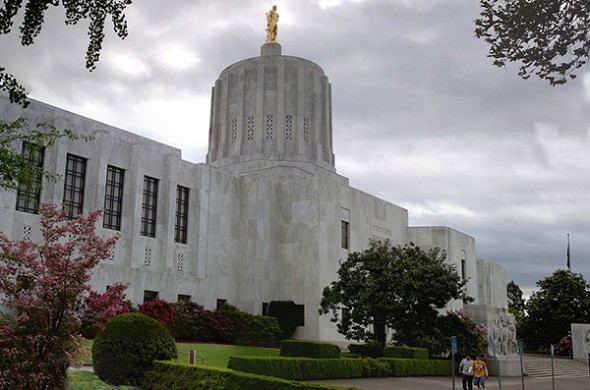Legislative Wrap-Up 2018
Posted on March 19, 2018 by Samuel Pastrick
Tags, Energy, Telecommunications, General Interest

CUB Leads Charge as Oregon Becomes a Net Neutrality Trail Blazer
CUB was the principal consumer advocate for HB 4155, ensuring net neutrality for Oregon Internet customers. After bipartisan votes in both the House and Senate, the Oregon Legislature sent the bill to Governor Kate Brown in early March. We expect her to sign the bill into law soon.
Special thanks must go out to the bill’s chief sponsor, House Majority Leader Representative Jennifer Williamson, our primary lobbying ally, Oregon ACLU, other supportive organizations, and the almost 300 CUB members from across Oregon who “signed on” to our testimony.
Oregon is now one of a handful of states to take either legislative or executive action to protect customers from Internet service providers that could otherwise seek to block legal content, throttle Internet traffic, or prioritize certain content for payment. State-level intervention is necessary due to the Trump FCC’s elimination of the latest round of net neutrality rules adopted in 2015.
HB 4155 uses governmental procurement powers to ensure net neutrality. The bill took this tack because federal law currently limits states’ ability to regulate the Internet directly.
This is how the new policy works: The State of Oregon, which owns a physical network asset, and public bodies within the state (cities, towns, political jurisdictions and the like), generally contract with private Internet service providers to deliver “last mile” Internet service to residents. Through those contracts, Internet service providers gain access to transportation and utility infrastructure, or public right of way. HB 4155 stipulates that in order for a public body – such as the City of Portland, Coos Bay, or La Pine – to contract with a last mile provider (allowing the company to use their infrastructure), the company must attest to neutral network management in delivery of service to all of their customers. The bill goes into effect on January 1, 2019.
Expanded Opportunities for Rural Broadband
CUB also supported HB 4023, legislation that seeks to leverage the state-owned fiber network – used by Oregon’s four research universities (OSU, UofO, OHSU and PSU) and is overseen by the state’s Office of the Chief Information Officer (CIO) – to improve high-speed Internet connectivity in un-or-underserved parts of rural Oregon. While this was a lower profile bill than HB 4155, it faced stiff opposition from Internet service providers and fiber infrastructure developers. Because HB 4023 will bolster the State’s power as a market participant, private industry players objected to what they see as the potential for unfair competition.
Initially, private industry did express valid concern. The bidding process for new broadband infrastructure contracts must be fair and transparent, and the Office of the CIO should award contracts to the bidder that can get the job done for the least cost and the least risk, while also prioritizing un-or-underserved rural areas. The trouble, however, is that industry continued their loud objections, even after the Joint Committee on Information Management and Technology adopted amendments to address their complaints.
It is worth noting that the amendments to HB 4023 resulted in unanimous support in the House, and bi-partisan support in the Senate. Representatives Pam Marsh (D), David Brock Smith (R), and Nancy Nathanson (D) played leadership roles in this regard.
Legislative implementation of this bill includes rule making, which CUB will monitor closely as an invited member of the “Broadband Services Advisory Committee”.
Home Weatherization, Retrofit, and Affordability Program Dies in Committee
In the wake of last year’s Renewable Energy Tax Credit sunset, Representative Pam Marsh and outside stakeholders developed a new approach to drive energy efficiency and renewable energy investment, with an emphasis on affordable housing and the needs of low-income Oregonians. CUB’s supportive testimony stressed the need for a statewide incentive program and the value of energy efficiency. HB 4121 moved out of the House Economic Development and Trade Committee with only one “no” vote, representing significant bipartisan support. Nevertheless, the bill died in the Ways and Means Committee. CUB anticipates a reprisal of this bill in 2019.
Looking Ahead to 2019
Digital Privacy for Oregon Internet Customers
CUB, along with our partner, ACLU of Oregon, will work between now and the 2019 legislative session to develop strong legislation ensuring that Internet service providers protect the privacy of their customers’ sensitive personal information. House Majority Leader, Representative Jennifer Williamson, introduced data privacy legislation in 2017, and we anticipate her championing this issue once again in 2019.
Cap and Price on Carbon
CUB will work through the rest of this year with a broad range of stakeholders on the utility component of anticipated 2019 legislation to cap greenhouse gas emissions in Oregon and put a price on carbon. One vehicle for sharing CUB’s utility regulation expertise will be an interim Joint Committee on Carbon Reduction, chaired by Senate President Peter Courtney and House Speaker Tina Kotek. Additionally, we anticipate working with Governor Kate Brown’s new Carbon Policy Office, which is also dedicated to passing strong and comprehensive climate change legislation during the 2019 session.
To keep up with CUB, like us on Facebook and follow us on Twitter!




09/05/22 | 0 Comments | Legislative Wrap-Up 2018